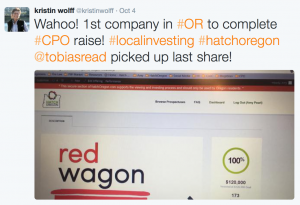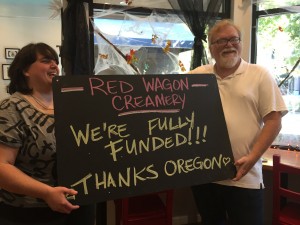Crowdfunding, Local Investing & Community Wealth Building Gaining Momentum in Oregon
n January 22 of this year, securities crowdfunding was made legal in the state of Oregon. In no small part, this was the result of Hatch Innovation (full disclosure: I’m a board member) and colleagues in the small business support community studying the options, drafting language, and working with state agency staff and policy leaders to flip the switch on new law.
For the first time, regular Oregonians (the 97+ percent of us with a net worth of less than $1M) could invest in Oregon businesses – no broker, no middle-person, no-nonsense. (A little more here, and a lot more here.)
Since then, Hatch and colleagues all over Oregon have hosted tours and events to both introduce the law and connect companies using the law to raise capital with potential investors. HatchOregon was the first platform to enable investing (Our friends at Chroma just joined the movement – congrats Mike and Marcus!).
Oregon’s small business champions have been working very hard to help companies and communities make the law work for them. As I’ve said many times and continue to believe, the investor side is the key – and it’s a challenge to help people understand that they have the right to do something (invest) that most didn’t know they couldn’t do before. (That’s why we’re organizing InvestOR Meetups all over the state).
Why All the Fuss about Regular Investors?
In short, there are a lot of them. We did the math. If Oregonians invested just one-percent of their savings this way, Oregon would see nearly $1B flow into the economy – the biggest stimulus package the state has ever seen. But it’s hard to get people to think of themselves as investors. It’s personal.
I suspect I’m like a lot of people. I enroll in 401K programs when it’s possible and contribute to an IRA when they are not. I know what it is to scrape by and also to advance. My husband and I own a few shares of a few companies (many based in Oregon) through funds and a few CDs, but we are not investors (you know, people who barely pay attention to their salaries because that’s not where they make their real money).
But when the opportunity came to invest in a business directly – one we know and love, one in which we know the owners – we read the prospectus, visited the shop, and ate the ice cream(!). And we invested (we also invested in other Oregon businesses).
Suddenly, we found ourselves telling everyone we knew about Red Wagon Ice Cream (Eugene, OR). We brought Red Wagon to family birthday parties. We (okay, I) tweeted about it.
We met other investors, got engaged in growth strategy discussions, and even talked to our local Whole Foods (which carries Red Wagon – a result of the Community Public Offering itself) about putting signage out to tell people they can do more than buy Red Wagon, they can invest in it (or could, until just recently).
Then, on October 4 – about 8 months after launch – Red Wagon completed its raise.
Because Red Wagon let us know ahead of time, I was there when it happened – together with Hatch Executive Director Amy Pearl, Small Business Advocate in the Oregon Secretary of State’s Office Ruth Miles, Slow Money coordinator Erin Ely, business owners Stuart and Emily Phillips, local families and customers who were also investors, and customers who happened to stop in for ice-cream that day were all there to celebrate. We met parents who had purchased shares for their kids, one still in a stroller (yes, Oregon law allows this).
Nearly one-hundred and fifty Oregonians invested a total of $120,000 in the company.
Investing More than Money
It strikes me how very real all of this investing felt. We learned other investors had help Red Wagon with its website, communications, and offered other professional services. And Red Wagon doesn’t just make terrific ice cream, it also uses real food as ingredients and sources as locally and in-season as it can (and my favorite ice cream, Hail to the Bee, even kicks back 1% to support the Save the Bee campaign).
The premise of the law (and of crowdfunding more generally) is a lot like barnraising – small investments from many people grow the kinds of businesses we want in our communities. We saw this born out that day.
But there was something else too. We were helping to build community wealth. The benefits of this kind of investing are not concentrated and captured – they ripple out. And they are not just economic, but social and environmental, too.
That’s the real promise. A new kind of economic development in which anyone can participate and from which everyone can benefit.
It’s still early days – only a hand full of other states had similar laws when Oregon’s went into effect. But momentum is on our side. Today, less than nine months later, 29 states have enacted such laws, and eight more have legislation in development or pending. By my count, that 37 states.
Securities crowdfunding is coming of age (that’s why Hatch Innovation is convening a national conference called ComCapUS in 2016). Join the movement in Oregon or one of the 36 states, or start your own in the other 13.








